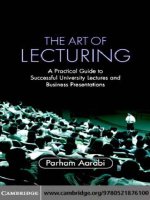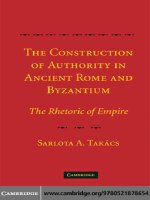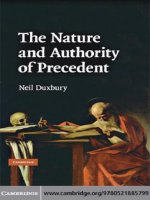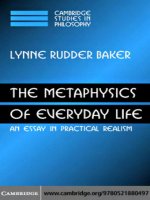0521853540 cambridge university press the making of the chinese state ethnicity and expansion on the ming borderlands jul 2006
Bạn đang xem bản rút gọn của tài liệu. Xem và tải ngay bản đầy đủ của tài liệu tại đây (1.15 MB, 239 trang )
This page intentionally left blank
Rationality and the Ideology of Disconnection
Rationality and the Ideology of Disconnection is a powerful and provocative
critique of the foundations of Rational Choice theory and the economic
way of thinking about the world, written by a former leading practitioner.
The target is a dehumanizing ideology that cannot properly recognize that
normal people have attachments and commitments to other people and to
practices, projects, principles, and places, which provide them with desireindependent reasons for action, and that they are reflective creatures who
think about what they are and what they should be, with ideals that can shape
and structure the way they see their choices. The author’s views are brought
to bear on the economic way of thinking about the natural environment and
on how and when the norm of fair reciprocity motivates us to do our part in
cooperative endeavors. Throughout, the argument is adorned by thoughtprovoking examples that keep what is at stake clearly before the reader’s
mind. To anyone who wishes to grasp what matters in the now highly charged
debate about rational choice theory, this book is indispensable.
Michael Taylor is a professor of political science at the University of
Washington in Seattle. He has taught previously at the University of Essex in
England and at Yale University. He was for many years a leading practitioner
of rational choice theory and published two influential books on cooperation in the absence of centralized coercion: Anarchy and Cooperation (later
revised as The Possibility of Cooperation, 1987) and Community, Anarchy, and
Liberty (1982).
Contemporary Political Theory
Series Editor
Ian Shapiro
Editorial Board
Russell Hardin
John Keane
Phillipe Van Parijs
Stephen Holmes
Elizabeth Kiss
Philip Pettit
Jeffrey Isaac
Susan Okin
As the twenty-first century begins, major new political challenges have arisen
at the same time that some of the most enduring dilemmas of political association remain unresolved. The collapse of communism and the end of the
Cold War reflect a victory for democratic and liberal values, yet in many of
the Western countries that nurtured those values there are severe problems
of urban decay, class and racial conflict, and failing political legitimacy.
Enduring global injustice and inequality seem compounded by environmental problems; disease; the oppression of women and racial, ethnic, and
religious minorities; and the relentless growth of the world’s population. In
such circumstances, the need for creative thinking about the fundamentals
of human political association is manifest. This new series in contemporary
political theory is needed to foster such systematic normative reflection.
The series proceeds in the belief that the time is ripe for a reassertion of the
importance of problem-driven political theory. It is concerned, that is, with
works that are motivated by the impulse to understand, think critically about,
and address the problems in the world, rather than issues that are thrown up
primarily in academic debate. Books in the series may be interdisciplinary in
character, ranging over issues conventionally dealt with in philosophy, law,
history, and the human sciences. The range of materials and the methods of
proceeding should be dictated by the problem at hand, not the conventional
debates of disciplinary divisions of academia.
Other books in the series:
Ian Shapiro and Casiano Hacker-Cordon
´ (eds.)
Democracy’s Value
Ian Shapiro and Casiano Hacker-Cordon
´ (eds.)
Democracy’s Edges
Brooke A. Ackerly
Political Theory and Feminist Social Criticism
Clarissa Rile Hayward
De-Facing Power
Continued after the index
Rationality and the Ideology
of Disconnection
Michael Taylor
University of Washington, Seattle
cambridge university press
Cambridge, New York, Melbourne, Madrid, Cape Town, Singapore, São Paulo
Cambridge University Press
The Edinburgh Building, Cambridge cb2 2ru, UK
Published in the United States of America by Cambridge University Press, New York
www.cambridge.org
Information on this title: www.cambridge.org/9780521867450
© Michael Taylor 2006
This publication is in copyright. Subject to statutory exception and to the provision of
relevant collective licensing agreements, no reproduction of any part may take place
without the written permission of Cambridge University Press.
First published in print format 2006
isbn-13
isbn-10
978-0-511-24578-7 eBook (EBL)
0-511-24578-5 eBook (EBL)
isbn-13
isbn-10
978-0-521-86745-0 hardback
0-521-86745-2 hardback
isbn-13
isbn-10
978-0-521-68704-1paperback
0-521-68704-7 paperback
Cambridge University Press has no responsibility for the persistence or accuracy of urls
for external or third-party internet websites referred to in this publication, and does not
guarantee that any content on such websites is, or will remain, accurate or appropriate.
Contents
Preface
page ix
Part one: Attachments, reasons, and desires
1
Attachments: five stories
1.1.
1.2.
1.3.
1.4.
1.5.
“The world has left the earth behind”
“The meeting point of two worlds”
“The money means nothing”
“The land . . . is part of us”/“Stay with it; stay with it”
“You do not sell the land the people walk on”
3
6
11
17
23
2
Narratives, identities, rationality
31
2.1. Narratives
2.2. Ideals, identities, and self-understanding
2.3. Desire and the structure of reasons
3
31
35
42
Part two: Strokes of havoc: the market ideal and the
disintegration of lives, places, and ecosystems
3
The market utopia
59
3.1. The market ideal
3.2. Efficiency in practice
3.3. Consumers, citizens, human beings
59
63
75
4
84
Dis-integration
4.1. The market dystopia and the loss of self and meaning
4.2. The “most productive” use of ecosystems
84
93
vii
viii
Contents
Postscript to part two: “can selfishness save the
environment?”
112
Part three: Living in unity, doing your part:
rationality, recognition, and reciprocity
5
Introduction: doing your part
127
6
The rationality of reciprocity
134
6.1. Some experimental games
6.2. Doing what we ought to do, if it pays
134
145
7
Normativity, recognition, and moral motivation
155
8
Citizens and workers: the argument illustrated
173
8.1.
8.2.
8.3.
8.4.
We’ll be citizens – if you’ll let us
The citizen’s duty to vote
Workers and managers: on hierarchical cooperation
Social order: or why most people are not crooks
173
178
188
199
Index
211
Preface
I intend this book as a contribution to the overthrow of a radically
reductive and dehumanizing but deeply entrenched way of thinking.
It is entrenched most completely in the discipline of economics – it
is part of what defines neoclassical economics – and because of this
has come to have enormous influence on how public policies of all
kinds are made, and in this way affects all our lives, especially here in
the United States. It has also made roads into the thinking of people
in a variety of other academic disciplines, especially political science,
where it has, for example, largely framed the discussion of when and
why people are disposed to do their part in promoting common interests – a subject that is of fundamental importance in the study of politics because a great deal of governmental and other political activity
and organization would not be necessary if most people were generally willing to do their part in advancing shared interests, and because,
at the same time, democratic governance would not work well if most
people were not generally prepared, without being coerced, to do their
part in certain cooperative endeavors. Some environmentalists, too,
among them even some well-known biologists, have fallen under
the sway of the economists’ version of this way of thinking, or at least
have become willing to make selective use of it when they believe it
will serve their purposes in the short run: they say, for example, that
we should preserve biodiversity because it pays to, and in general to
save the environment we must appeal to the businessperson’s bottom
line and the consumer’s famous pocketbook.
At the foundation of this way of thinking about the world – an
ideology if ever there was one, as the whole of this book will make
ix
x
Preface
plain – is the idea that human beings are moved only by desires, that
their choices are to be understood always as being the resultant of
weighing or trading off desires.
What is wrong with this? Human beings make promises and agreements, explicitly and tacitly, and generally they feel bound by them.
They help to create or enter into or find themselves in certain relationships, with particular other individuals and with groups, and it would
not occur to them to act except as required by such a relation, in ways
that, in fact, are constitutive of the relation. They commit themselves
to social practices and abide by the norms that define such practices,
and again generally it would not occur to them to do otherwise. They
make moral judgments, judgments of right and wrong, and then feel
bound by them. Many people see (and many more in the past once
saw) themselves as links between past and future generations or even
as in part constituted by those links, and this may be bound up with
a deep attachment to a particular place (for place – one to which
humans can be attached – is never just a matter of physical location
and physical objects, but is something made significant by human
history, by events); and again, as a result of such attachments people
can feel bound to act in certain ways.
In these and other ways we humans create for ourselves reasons for
action that have force at the time of choice whether or not we want
(in an ordinary nontautological sense of desire that I shall later try
to make clear) to do that action. We create for ourselves what John
Searle calls desire-independent reasons.
Human beings are conscious of themselves. They are self-reflective.
They think about what they are: they have descriptive self-conceptions or self-understandings. They also think about what they ought
to be – about the kind of person they should be, and how they should
live their lives: they have normative self-understandings. They endorse
or set for themselves ideals – moral ideals or the ideals (or standards)
associated with and in part constitutive of the attachments and commitments to people, practices, projects, and places that I mentioned
previously.
Although they may not be articulately held or consciously deployed
or aimed at, these ideals directly provide us with motivating reasons to act. In some cases they also structure or frame the way we
Preface
xi
see a choice situation and determine what other considerations in
that situation provide reasons for action: they may totally silence or
exclude some reasons (such as a generally operative desire for pecuniary gain) or they may diminish their reason-giving force. When a
person’s ideals structure or modulate her choices in these ways, I shall
say that they form her identity. So a person’s identity is the part of
her normative self-understanding that structures and modulates her
choices.
These connections we make to the world and their capacity to move
us directly and to structure the way we see and make our choices are a
large part of what makes us human. If economists and other Rational
Choice theorists take account of them at all, they misrepresent them;
they do not understand them for what they really are. In fact, they
cannot accommodate them in their theories, because those theories
are committed to understanding human action solely in terms of
desires (or preferences). They take the idea of desire to be primitive
and foundational; they lump together as “desires” several different
sorts of things (or simply assume that if someone chose something he
must have wanted it, that he must have been motivated by a desire);
they take it for granted that these desires can be balanced or traded
off against one another – that they are, as it were, all on the same
level and can all be put into a single utility function to be maximized;
and they assume (tacitly, because the possibility seems not even to
occur to them) that there are no desire-independent reasons, hence
nothing that can structure those desires, nothing that can silence or
suppress them or diminish or qualify them in any way.
Thus, although economists and other Rational Choice theorists
sometimes talk about altruism, commitment, community, social
approval, and those self-assessing but highly social emotions, guilt
and shame, the subjects of their theories are not truly social. Moved
only by desire, by what they want or prefer, they also are not rational,
for reason’s only role in these theories is to guide people (not motivate them) as they try to get what they want. Rationality (I shall take
it) requires at least the capacity to consider and be moved by reasons, including those provided by our ideals, by our normative selfunderstandings. (For this reason I shall capitalize the initials of Rational Choice whenever I am referring to the model of choice assumed
xii
Preface
by Rational Choice theorists, whose practice denies rationality to its
subjects.)
In these ways, Rational Choice theory denies its subjects capacities
and dispositions that are an important part of what makes us human.
It denies them also – and in many cases (as we shall see) denies much
else besides – to real human beings when it is put into practice: when it
advocates and legitimates public policies and projects that are predicated on the premise that humans are moved only by their wants,
and especially when the further assumptions of the normative part of
neoclassical economics (“welfare economics”) are added, assumptions that together imply that the value of anything to anybody is
fully replaceable, so that anyone can be compensated for the loss of
anything.
In Part One of the book I sketch (in Chapter 2) the general argument about ideals and identities, desires, and the structure of reasons, after first (in Chapter 1) trying to soften the reader up a little
with some discussion of several examples of choices, made (with one
exception) by real people, that cannot be explained or understood by
the Rational Choice model without being radically misrepresented
and trivialized. Some of these choices (involving, for example, the
rejection by poor people of fabulous sums of money) are extraordinary, but I hope to convince the reader in the rest of the book that my
argument applies to the more mundane choices we make every day.
Economists don’t just use the model of Rational Choice to explain
social behavior; they idealize a world in which it holds, a world in
which there are no desire-independent reasons, no framing or structuring ideals (provided, for example, by attachments or connections
of the kind I discuss in Part One), no normativity, and no moral
motivation. This is the world of the Market Ideal, the economist’s
utopia, where anything people care about is a commodity, where
everything of value is owned and consumed as a private good, where
every “resource” is put to its “most productive” or “most highly valued” use, where all problems, including environmental problems,
are defined as the failure of markets to produce efficient allocations
of resources. In Part Two of the book I shall look at what happens
in this world of the Market Ideal to the individual human being, her
communities, and her natural environments.
Preface
xiii
Economists proudly proclaim their commitment to the principle
of “consumer sovereignty” – the principle that people’s wants or
preferences, as expressed by the choices they make in markets, must
be respected; they must not be judged. But normal people certainly
judge their own preferences, and economists are repeatedly told,
when they conduct “contingent valuation” surveys, that social choices
about public projects and policies should not be made on the basis of
what individuals want (especially wants they express as isolated buyers in markets), and it would seem that the respondents who reject
these surveys think that such decisions should take account of their
judgments, their beliefs about what ought to be done, which perhaps
they can discover or develop in a process of public deliberation. (Contingent valuation surveys are conducted when there is no market – as
there is not for whooping cranes, Grand Canyons, or stratospheric
ozone layers – in which people’s values can, so the economist claims,
be inferred from the choices they make – from what they are willing
to pay for things.) Economists reject this: consumers are sovereign
but human beings apparently are not. Economists deny their subjects
the distinctively human capacities and dispositions that I describe in
Part One of the book – above all to endorse and be moved by ideals
that determine the reason-giving force of other considerations – and
insist instead that they think and choose according to the neoclassical version of the Rational Choice model. All this, as I hope to make
clear, is far from being a merely academic matter.
In Part Three of the book, and with further help from T. M. Scanlon’s account of moral motivation and What We Owe to Each Other,
I bring the general argument of Part One to bear on a topic that is
fundamental for all the social sciences, namely whether, why, and
when people will do their part in mutually advantageous cooperative
endeavors. I believe the norm of fair reciprocity must play a central
role in our understanding of these things, but not in the way proposed by economists and other Rational Choice theorists. They have
recently come to recognize that people seem to cooperate more often
than is predicted or explained on Rational Choice assumptions (in
one-shot Prisoners’ Dilemma games, for example) and that people
seem to be disposed to conform to a norm of fair reciprocity. But
in trying to explain why this is so, they have once again resorted to
xiv
Preface
the standard model according to which choice is always, in effect, the
outcome of a competition of unstructured, comparable desires. On
the Rational Choice account, cooperation and noncooperation are
both explained by the balance of benefits and costs; there is only one
sort of motivation at work. If people are recognized as caring about
the fairness of outcomes, this is represented as just another desire or
preference, to be balanced against other desires in a utility function.
Or it is assumed that the norm of reciprocity or fairness plays the
role merely of a shared belief that enables people to coordinate their
actions to select an equilibrium – helping each person to maximize
his utility in the light of what he expects others to do. In either case,
the norm has no motivating power of its own. The essential characteristic of a norm – its normativity – is therefore ignored or assumed
away. I shall argue instead that, first, doing your part in a cooperative
endeavor (from which you will benefit even if you do not contribute)
is a part of most people’s normative self-understanding, and that the
norm of fair reciprocity therefore provides, in the right conditions,
a motivating reason to act, one that structures or modulates other
reasons for or against doing your part in cooperative endeavors; but
second, this moral motivation can be deactivated or demobilized and
replaced by Rational Choosing when people are not recognized as
fully human beings – beings with the capacities and dispositions I
described in Part One – but are instead treated as if they were in fact
specimens of Homo economicus, radically asocial animals manipulable
or movable only by incentives. (In other words – I am not denying –
people sometimes act like Homo economicus.)
Readers familiar with the work of the philosophers Thomas Nagel,
Bernard Williams, Joseph Raz, Elizabeth Anderson, and T. M.
Scanlon and the criminologist John Braithwaite will recognize my
special debt to them. For many years I practiced what I here attack.
But almost from the beginning I had my doubts. For a while my
response to these doubts was a version of the argument that Rational
Choice theory applied only in certain domains, or only to certain
sorts of choices, essentially those in which a great deal – in terms of
the benefits and costs specified in the explanation in question – turns
on the individual’s choice. But, if it is not a tautology, this argument is
shown to be wrong by examples of the kind I discuss in Part One, and
Preface
xv
the general argument I make there implies that it is beside the point.
For some years I spent much of my time seeking out and thinking
about difficult cases for the Rational Choice approach, even while
continuing to defend it (in a retrenched domain). It was not until,
belatedly, I came to see the sometimes devastating consequences (for
human lives, for communities and cultures, and for the natural environment) of government decisions made on the assumption that people think and choose in the way assumed by economists and other
Rational Choice theorists that I decided I should write this book. But
in finding my way out of the Rational Choice way of thinking, I was
helped enormously by the work of the philosophers I have mentioned,
and the form in which I now express my views derives largely from
their work. (They are not, of course, to be blamed for anything here.
Nor is anyone else mentioned in this Preface.) I was helped too, at an
early stage, by another philosopher, Michael Smith, who kindly took
some time, while I was a visitor at the Australian National University,
to introduce me to the arguments for and against the (neo-) Humean
theory of motivation, of which he is perhaps the most able defender.
Originally this book included a short essay on some novels of
Patrick White, especially The Solid Mandala. His work has been
important to me. I have learned as much about identity and integrity
from his writings as from anyone’s.
I have many other debts. It is a little embarrassing for me to realize
that I first tried out an earlier and eventually rejected version of some
of the arguments presented here in a public seminar on commitment,
identity, and rationality that I gave at the University of Washington as
long ago as early 1991. In the same year I had interesting discussions
with several members of the Tribal Council of the Yakama Nation (in
Washington State) and I am most grateful to them. (Those discussions left me uncertain about the motivations at work in the Council
decision that I had gone to talk with them about, a decision of a
kind I discuss in the first chapter that follows, and so I decided not to
include any account of it here.) In the following school year, gratefully
spent at the Center for Advanced Study in the Behavioral Sciences
at Stanford, I divided my time between doing Rational Choice explanation and thinking about what was wrong with it and whether I
could go on defending it. Soon after that I had interesting and useful
xvi
Preface
discussions with a group of people who were fighting to prevent the
mountain they lived around – Buckhorn Mountain in north central
Washington – from being taken apart by a multinational corporation bent on developing a cyanide leach-heap gold mine there; they
were most hospitable and their company most enjoyable. Some of
the arguments here I tried out at a conference in Stockholm and at a
seminar in the sociology department at the University of Stockholm;
at both of them I received useful comments, especially from Richard
Swedberg. The argument I make here about cooperation in hierarchies and an earlier version of the argument about the activation and
deactivation of the norm of fair reciprocity went into a paper entitled
“Good Government: On Hierarchy, Social Capital, and the Limitations of Rational Choice Theory,” which was eventually published in
the Journal of Political Philosophy, and I am grateful to the publisher
of that journal for allowing me to use a few paragraphs of my article.
A draft of that article was circulated at a conference on social capital convened at Cape Cod in 1994 by Robert Putnam; I had some
useful discussions about it with several participants, particularly Jane
Mansbridge. It was also presented around that time to a conference
at the Center in Political Economy at Washington University.
I am grateful for their help to Julius Kincs and Xila MacLeod and
to several other people in and around Alto in Portugal whose names
I did not learn and especially to Robin Jenkins, who did the study of
Alto that I discuss in the first chapter. I discussed my visit to Alto
and made some of the arguments presented in this book at a seminar
in the School of Economic and Social Studies at the University of
East Anglia (at Norwich in England). I thank Edwin Lyon, archeologist at the U.S. Army Corps of Engineers’ regional office in New
Orleans (assertively built right on a levee of the Mississippi), and
Kirsten Lahlum, Librarian at the Corps’ regional office in Portland,
Oregon, for helpful discussions and for making documents available
to me. I am grateful to the many people, not already mentioned,
whose writings I have put to work (I hope without distortion) for my
own purposes – especially John Berger, Boyce Richardson, Wendy
Espeland, and Edward Lazarus. I hope I have made all due acknowledgments in my notes. And lastly, I thank the people who have discussed this work with me or commented on earlier versions of all
Preface
xvii
or parts of the book, especially John Braithwaite, Gardner Brown,
Eugene Hunn, Jim Scott, Sara Singleton, Eric Alden Smith, and,
most of all, Alan Carling. To Alan Carling I owe many improvements
to my text, though I fear I have not adequately met all of his penetrating challenges to my argument. To Gardner Brown I would like
to say that if the cost-benefit analyses that have been used to justify
many of the large dams and other projects in the United States had
been conducted by him, the world would be a better place. (See the
chapter on him – “Dr. Brown Flies the Eel” – in Ted Simon’s book,
The River Stops Here.)
I have learned from many people, and I thank them all.
Part one
Attachments, reasons, and desires
. . . & is he honest who resists his genius or conscience only
for the sake of present ease or gratification?
William Blake
“A memorable Fancy”
Plates 12–13 in The Marriage of Heaven and Hell
1
Attachments: five stories
1.1.
“The world has left the earth behind”
In his luminous fictional trilogy, Into Their Labours, John Berger
describes in the first two volumes, Pig Earth and Once in Europa,
the world of a small peasant village in the French Alps, a village that
until very recently must have been fairly remote from big cities, as it
begins to come apart with increasing contact with the wider economy
and market mentality of the outside world, and, in the final volume,
Lilac and Flag, the scattering of its children to the big cities.1
In the village and the country around it we see, as we move through
the first two volumes, an older peasant mentality, the mentality of a
culture of survival and intergenerational continuity with (as Berger
says in his Introduction) a “profound suspicion of money,” collide
with a mentality that is still fairly novel to most of the villagers, a
mentality that some would call capitalist, though it is wider than
that and which, for now, we can call the market mentality as long as
we remember that it is not confined to societies in which economic
transactions are governed largely by competitive markets.
On three occasions in the trilogy someone refuses to sell something. Marcel, of Pig Earth, refuses to sell his old cider press. In Once
in Europa Odile’s father refuses to sell his farm to the owners of the
factory complex that now completely surrounds the farm and is poisoning the land and mutilating its own workers. “The owners first
doubled, then trebled, the price they were prepared to pay him. His
1
John Berger, Into Their Labours (New York: Pantheon, 1992).
3
4
Attachments, Reasons, and Desires
reply remained the same. My patrimony is not for sale” (p. 277).
And finally, in Lilac and Flag, Sucus, the migrant worker searching
for home and love and a little security in the alien city, refuses to sell
his knife, though he is desperate for money, because the knife was his
father’s.
Let us go back to Marcel. Not everyone in the village is like Marcel.
He is the only one left who still plants new apple trees – grown from
seedlings that had sprouted from the marc (the residuum from pressed
cider apples) that he buried each year in a corner of his garden. He
doesn’t expect his children to stay on the farm. But he continues
to work with effort and care, though the farm will end with him,
because it is, he thinks, “a way of preserving the knowledge my sons
are losing,” and he plants the trees “to give an example to my sons
if they are interested, and, if not, to show my father and his father
that the knowledge they handed down has not yet been abandoned.
Without that knowledge, I am nothing” (p. 67).
One day, Marcel is pressing apples for cider, when one of those
sons, Edouard, returns from work. Earlier that day, Marcel has
observed Edouard at work trying to sell some sort of wonder-soap to
women in the market, an activity that in Marcel’s eyes is fraudulent.
Edouard, whom we’ve already seen exasperated with his father for
refusing to buy a tractor – for refusing the twentieth century – now
casually tells Marcel that he could sell the ancient oak cider press,
which has the date 1802 carved on it and has probably been in the
family for generations, as an antique. There’s a dealer he knows who
would pay a lot of money for it; in turn the dealer, he says, could sell
it to a bank or hotel, where, Edouard tells his astonished father, it
would become . . . d´ecor. To this proposal, Marcel’s only response is:
“The world has left the earth behind.”
Berger has nothing more than this to say about Marcel’s response.
But it is clear that Marcel lacks interest in selling the cider press for
half a million francs, though not because he thinks that he should be
paid more for it. To him it is ridiculous, unseemly, almost incomprehensible that it should become d´ecor in a bank’s lobby (where the
bank no doubt expects it to lend an aura of solidity, reliability, permanence, and integrity). It has never occurred to him to sell it, and
it is to him an alien thought that the press is merely potential money.
Attachments
5
With that money he could no doubt buy another, equally effective
press, and have much money to spare. But the cider press – this particular cider press – has a significance or meaning for him that no
other press could have. It is not just an old, familiar, and reliable
friend; it connects him to his past life – to among other things the
annually enacted routines of picking apples with his wife, and planting apple tree seedlings from the marc and making cider and gnˆole
and drinking them with family and friends; it is a link between past
generations and his own living family and, he forlornly hopes, future
generations; it represents and collects significance from the ancient
culture, the knowledge and customs, that have sustained him and his
ancestors.
All this is compromised when the press is thought of in terms of
the money it would fetch, or when it is thought of as interchangeable
with some other press, or as serving the extraneous purpose his son
suggests for it. (We should note here parenthetically that if Marcel
did voluntarily sell the press to, say, a bank, it would then, as our
twentieth-century neoclassical economists like to say, be finding “a
more valued use,” perhaps its “most productive use,” and that, say
the economists, would be good. We’ll return in Part Two to this
mad way of thinking). To sell the press – and especially to outsiders
beyond the peasant’s world who will not even continue to use it as a
cider press, to a hotel or bank moreover, which in peasant (and some
other) minds represent the very forces that are gradually destroying
the whole way of life that has given Marcel’s own life meaning – is, in
the mind of someone who thinks like Marcel, to de-mean his past life,
to disconnect and alienate him from his culture (while contributing to
a new one he cannot respect), to rupture the continuities that give
meaning and some measure of dignity to his life.2
2
Into Their Labours is in part about losing one’s home, about being an emigrant, especially from the country to the city. But I should add that Berger,
who writes elsewhere of the twentieth century as “the century of banishment,” does not believe that it is possible “to return to that historical state
in which every village was the center of the world. The only hope of recreating a center now is to make it the entire world. Only worldwide solidarity
can transcend modern homelessness. . . . ” And Our Faces, My Heart, Brief
as Photos (New York: Pantheon, 1984), p. 67.









